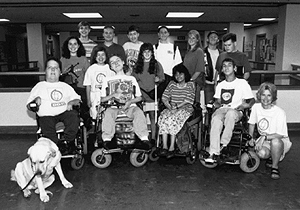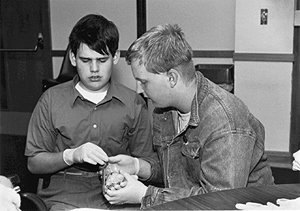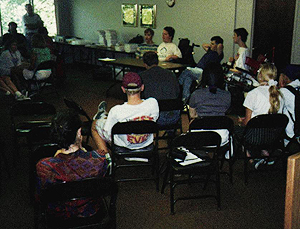A reprint with permission from Computer Wave
Adaptive technology and the Internet have opened many doors to those with disabilities. Just ask the high school students involved in Project DO-IT.
DO-IT is an acronym for Disabilities, Opportunities, Internetworking and Technology. This 3-year-old program, which is run primarily from the University of Washington, was started thanks to a grant written by DO-IT director, Dr. Sheryl Burgstahler, and funding by the National Science Foundation. Dr. Burgstahler had a vision of a program which would encourage disabled high school students to seek a college education and careers in the areas of math, science, or engineering. DO-IT is the product of that vision.
High schoolers accepted into the program are known as DO-IT Scholars. The first group of DO-IT Scholars numbered only 18, but already the program has had an impact on Scholars, Mentors, and staff, even beyond the expectations of Dr. Burgstahler.
The DO-IT program has been a success because of its unique organization. Broken up into three Phases, Phase I Scholars graduate to Phase II where they begin to act as mentors to the next class of incoming Scholars, and finally in Phase III they take on even more mentoring responsibilities.
Phase I begins with a two week session in which the Scholars live and work in dorms at UW, while also attending classes, lectures and demonstrations. Much of the Scholars' time is spent in computer labs learning to navigate the Internet. Other activities may include going to the Pacific Science Center, Mariners games, or the movies.
Throughout the first year Scholars explore the Internet. They gather information on subjects they are interested in and communicate with each other via e-mail. Internet accounts are provided by the UW on a computer named after world-renowned physicist, Dr. Stephen Hawking, who is disabled himself.
Upon admission to Phase II, Scholars design and complete science projects which deal with the specific interests they have researched on the Internet. Scholars work jointly with faculty and other professionals in order to develop the knowledge and skills learned in the previous year. These Phase II Scholars act as peer-mentors to incoming Phase I Scholars both through e-mail and face-to-face contact during the two week live-in program at the U-Dub.
In Phase III, veterans of the first two phases are given opportunities to be individual contributors to the DO-IT program through activities agreed to by each participant and the DO-IT staff. Some opportunities include specific mentoring responsibilities, scientific resource management, system administration, newsletter editing, working in summer programs, and helping with other DO-IT sponsored events, such as the DO-IT exhibition booth at the annual UW Computer Fair.
The young people learn about more than just math, science, and related subjects. They learn about each other. Last summer's Phase I Scholars built strong friendships through interaction with each other on a more personal level than the Internet can provide. For example, those in wheelchairs would guide those with vision problems.
DO-IT Scholar Rachel says that her best experience with DO-IT was "making many new friends who have various disabilities, but to me, seem totally normal."
If incoming students do not have the necessary equipment to connect to the Internet, DO-IT loans the equipment to them along with any adaptive technology required by the student. Such adaptive technologies include screen readers, text enlargers, special keyboards and mice, and sip-and-puff systems that use Morse Code. The students are allowed to keep this equipment as long as they are involved in DO-IT.
An important part of each Scholar's development in Phase I is communication between the Scholars and their Mentors. DO-IT Mentors include professionals, professors, and college students who are involved in the areas of math, science, or engineering. Most of the Mentors are disabled themselves, and while several of them are from UW, there are many from other colleges, universities, and organizations. A few of the Mentors even live in other countries.
The role of the Mentors is to provide support for the Scholars. Scholars and Mentors are broken into teams, based on disability. Mentors and Scholars build relationships by communicating via the Internet. The Mentors are encouraged to write to their team at least once a week, as well as communicate with Scholars outside their own team.
Being a Mentor can be beneficial to the Mentor as well as to the Scholar. "It has been good for me, despite the fact that I don't hear much from them," says DO-IT Mentor Roger Harris. "I like being part of a resource that may be of help to them someday."
Most Mentors understand that these high school students enjoy communicating with each other more than with those who are older. If a student ever has a question or problem though, the Mentors are glad to help.
One of the most important things to the Scholars is the ability for them to be seen as equal to everyone else on the Internet. Thanks to the adaptive technology they use, they are able to go out into the world on the net and communicate with people who have no idea the person on the other end of the connection is disabled. DO-IT Scholars really enjoy the opportunity to travel around the world without leaving the room.



